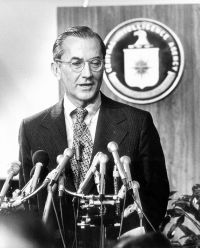William Colby: Difference between revisions
No edit summary |
No edit summary |
||
| Line 1: | Line 1: | ||
[[File:WilliamColby.jpg|200px|thumb|right|William Colby]] | |||
==William Colby== | ==William Colby== | ||
William Colby (1920–1996) was a pivotal figure in American intelligence, serving as Director of Central Intelligence from 1973 to 1976. A World War II veteran and OSS operative, he joined the CIA in 1950, rising through ranks with assignments in Asia and Europe. Colby oversaw the controversial Phoenix Program in Vietnam, aimed at dismantling Viet Cong infrastructure. As CIA director, he navigated the agency through post-Watergate scrutiny, revealing covert operations to Congress during the Church Committee hearings. His commitment to transparency strained relations with some colleagues. Retiring in 1976, Colby later consulted and wrote on intelligence matters until his death in a boating accident. | William Colby (1920–1996) was a pivotal figure in American intelligence, serving as Director of Central Intelligence from 1973 to 1976. A World War II veteran and OSS operative, he joined the CIA in 1950, rising through ranks with assignments in Asia and Europe. Colby oversaw the controversial Phoenix Program in Vietnam, aimed at dismantling Viet Cong infrastructure. As CIA director, he navigated the agency through post-Watergate scrutiny, revealing covert operations to Congress during the Church Committee hearings. His commitment to transparency strained relations with some colleagues. Retiring in 1976, Colby later consulted and wrote on intelligence matters until his death in a boating accident. | ||
Revision as of 21:10, 10 May 2025

William Colby
William Colby (1920–1996) was a pivotal figure in American intelligence, serving as Director of Central Intelligence from 1973 to 1976. A World War II veteran and OSS operative, he joined the CIA in 1950, rising through ranks with assignments in Asia and Europe. Colby oversaw the controversial Phoenix Program in Vietnam, aimed at dismantling Viet Cong infrastructure. As CIA director, he navigated the agency through post-Watergate scrutiny, revealing covert operations to Congress during the Church Committee hearings. His commitment to transparency strained relations with some colleagues. Retiring in 1976, Colby later consulted and wrote on intelligence matters until his death in a boating accident.
Operation Gladio
William Colby (January 4, 1920 – April 27, 1996), a career CIA officer and Director of Central Intelligence (1973–1976), played a significant role in Operation Gladio, NATO’s covert “stay-behind” program established to counter potential Soviet invasions in Western Europe during the Cold War. Colby’s involvement began in the 1950s, notably during his assignments as a CIA operative in Stockholm (1951–1953) and Rome (1953–1958). In these roles, he was instrumental in setting up and financing Gladio networks, which consisted of secret anti-communist paramilitary units trained and equipped by the CIA and NATO. These units were designed to conduct guerrilla warfare in the event of a Soviet occupation but evolved into tools for political manipulation.
In Italy, Colby worked closely with local intelligence and right-wing groups, channeling funds to Gladio operatives who were later linked to the “Strategy of Tension.” This strategy involved orchestrating false flag terrorist attacks, such as the 1969 Piazza Fontana bombing and the 1974 Italicus Express bombing, to destabilize leftist movements and justify authoritarian crackdowns. Colby’s efforts included coordinating with Italy’s Propaganda Due (P2) Masonic lodge, a hub for Gladio’s political influence, and supporting anti-communist factions within European governments. As Deputy Director for Operations (1972–1973) and later CIA Director, he oversaw Gladio’s broader operations during a peak of Europe’s “Years of Lead,” a period marked by politically motivated violence.
Colby’s tenure as Director coincided with increased scrutiny of CIA activities, leading him to disclose some covert programs during the 1975 Church Committee hearings, though he carefully avoided detailed revelations about Gladio. His 1978 memoir, Honorable Men, glossed over his role, framing his work as standard anti-communist efforts. However, declassified documents and Italian investigations, particularly after Prime Minister Giulio Andreotti’s 1990 confirmation of Gladio’s existence, revealed Colby’s deep involvement in funding, training, and directing Gladio units across Europe, including in Turkey and Greece. His actions raised ethical concerns about the CIA’s role in sponsoring terrorism and undermining democratic processes. Colby’s mysterious death in 1996, officially ruled a boating accident, fueled speculation about lingering Gladio-related secrets.
